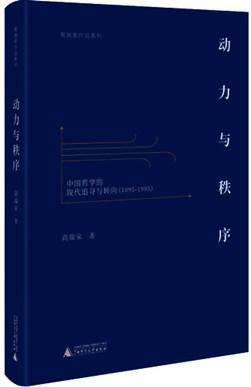How did 20th-century history impact Chinese philosophy
Author : LI WEIWU Source : Chinese Social Sciences Today 2021-01-12

The Development of Chinese Philosophy (1895–1995)
Written by Gao Ruiquan, a professor from the Department of Philosophy at East China Normal University, The Development of Chinese Philosophy (1895–1995) aims to clarify the internal relationships between China’s social history and the development of Chinese philosophy in the 20th century, revealing the forces driving 20th-century Chinese philosophy from the perspective of social history.
Gao stresses the mutual influence of historical backgrounds and philosophy, especially the development of philosophy which was profoundly impacted by historical backgrounds. In particular, the author focuses on the impact of the “grand age,” a great historical transition period, on the development of philosophy.
The period spanning from the Opium War (1840–1842) to the 20th century was a critical historical turning point for China, as the popular saying goes, “the profound changes were unseen for three millennia.” The author argues that the grand era deeply influenced the development of Chinese philosophy since the Opium War, which was the driving force for 20th-century Chinese philosophy.
20th-century China had its own distinctive historical feature—revolution. The Chinese revolutions of the 20th century contained rich historical connotations, as the Chinese nation pursued both liberation and rejuvenation. Based on the basic historic orientation of the “revolutionary century,” Gao divides Chinese social ideological trends in the 20th century into three types, indicating that their attitudes, theories, and practices together constituted the historical appearance of Chinese modernity. Furthermore, the author sub-divides these ideological trends into political, cultural, and philosophical levels.
For instance, in terms of radicalism, philosophical radicalism is the philosophical justification and spiritual core of political or cultural radicalism. This spiritual core itself has a genealogy which contains many modern philosophies, such as how potential radical tendencies of traditional philosophy were transformed in the modern ideological world. This provided support for radicalism in several different directions and degrees.
The 1980s and 1990s witnessed obvious changes in the field of Chinese philosophy. However, because of the diversity and complexity of these changes, it is difficult to grasp the general trends and basic links inherent in this stage’s philosophical history. The author analyzes the “social dynamics” of Chinese philosophy in the 20th century, and examines the social and historical background at the time, that is, the transformation of the revolutionary century from violent storms to peaceful development. He points out that historical transformation can be found in the evolution of 20th-century Chinese philosophy, which was demonstrated through a philosophical transition from seeking driving forces to establishing order.
Li Weiwu is a professor from the School of Philosophy at Wuhan University.
Ye Shengtao made Chinese fairy tales from a wilderness
Ye Shengtao (1894–1988) created the first collection of fairy tales in the history of Chinese children’s literature...
-
How northern ethnicities integrated into Chinese nation
2023-09-18
-
Mogao caves
2023-09-12
-
Mogao Grottoes as ‘a place of pilgrimage’
2023-09-12
-
Time-honored architectural traditions in China
2023-08-29
-
Disentangling the civilizational evolution of China
2023-08-28
-
AI ethics in science fiction
2023-08-23














 2011-2013 by www.cssn.cn. All Rights Reserved
2011-2013 by www.cssn.cn. All Rights Reserved